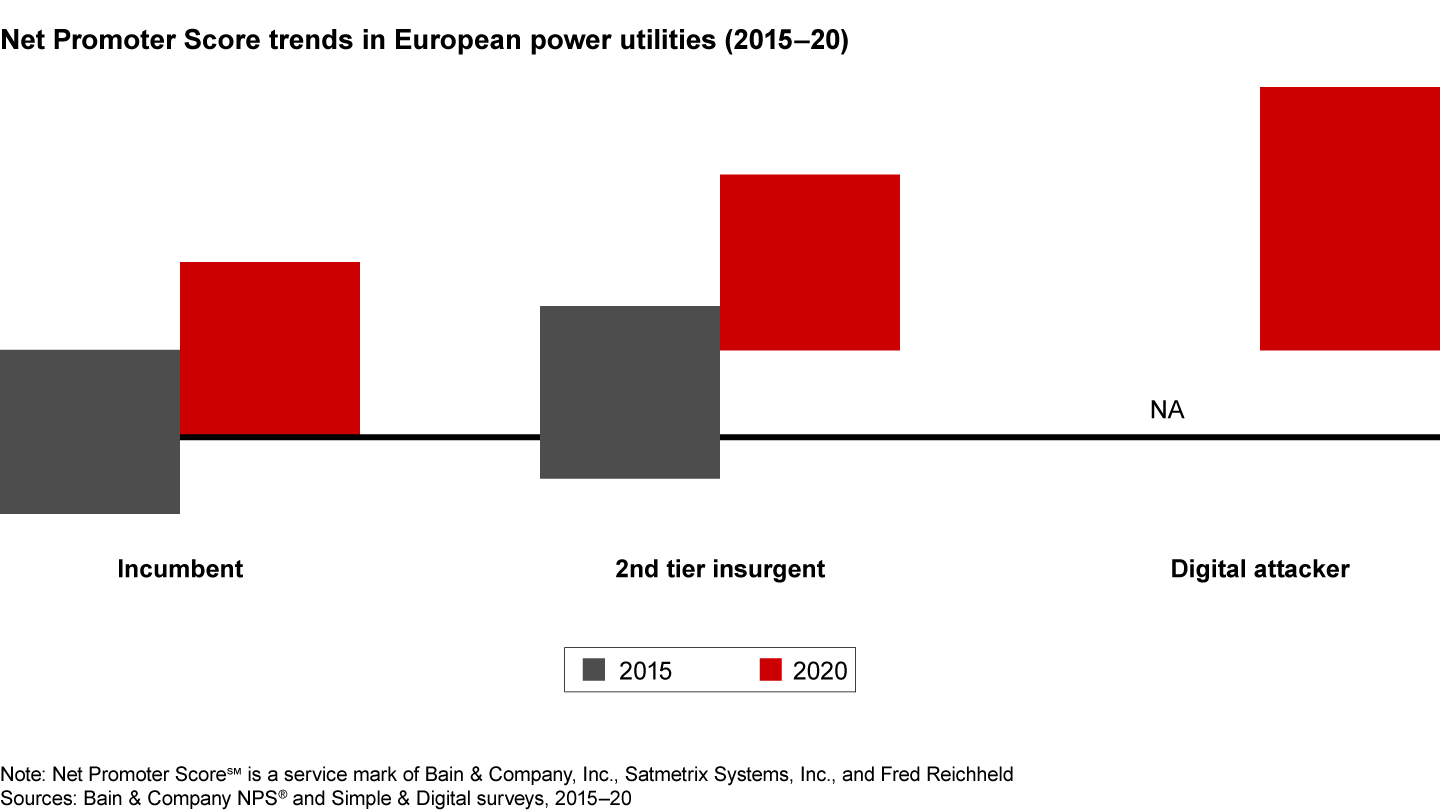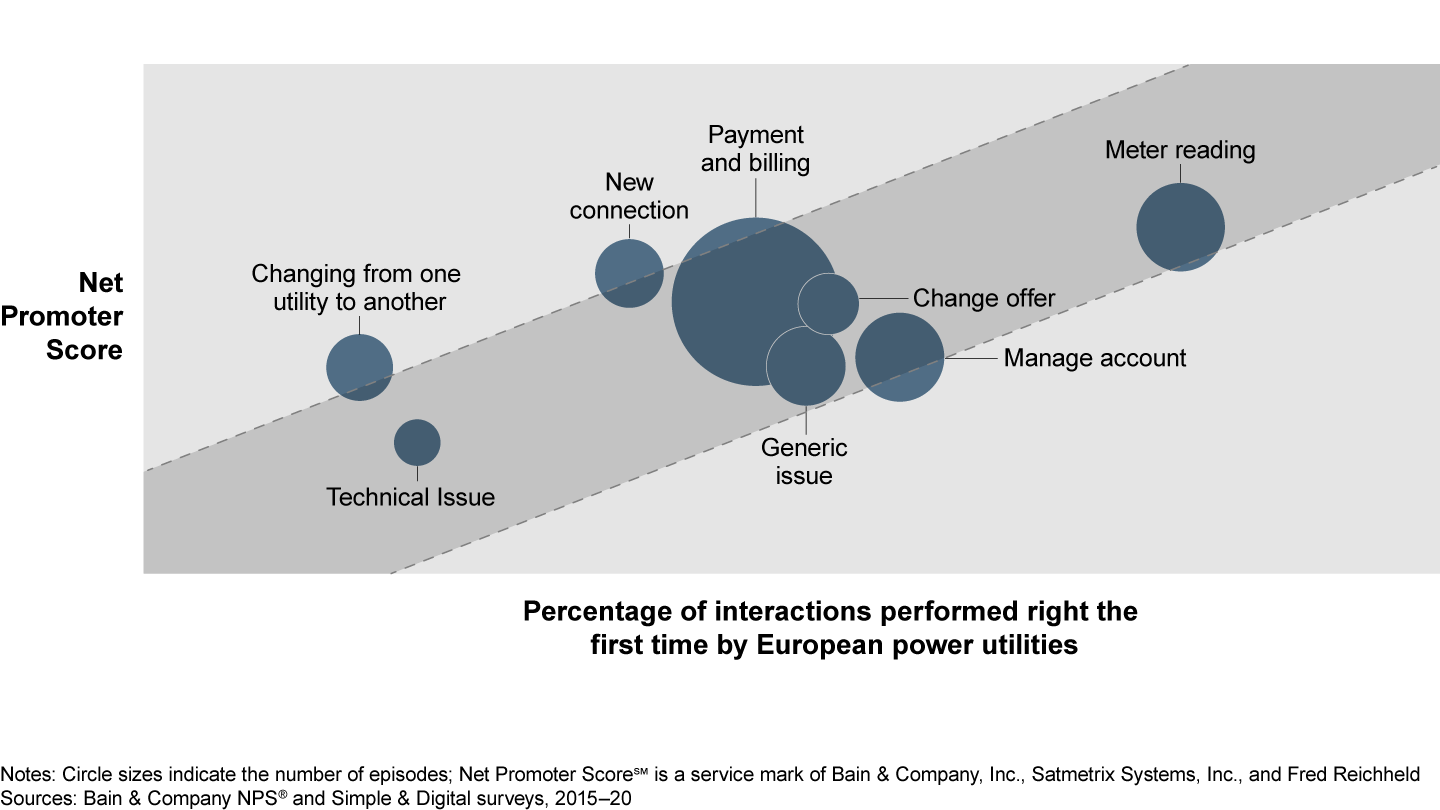Article

First, the good news: Customer loyalty scores for Europe’s power utilities have increased over the past five years for incumbents and new competitors alike (see Figure 1).

The bad news, at least for incumbents, is that they still trail the new entrants significantly, garnering Net Promoter Scores℠ that are, on average, 10 to 20 points below that of new competitors.
While we can applaud the older utilities for the progress they’ve made, the hard reality is that they’ll need to do even better, because customer loyalty matters more than it used to for utilities in Europe. Liberalization of market regulations over the past decade has opened the field for a new wave of competitors, launched in the digital era with no legacy costs and deploying lessons borrowed from customer experience leaders in other industries, such as telecommunications and banking. If incumbents don’t catch up on customer experience, these new insurgents will continue to take market share and may eventually take them over, as Ovo Energy did in the UK. Ovo, launched in 2009, takes a customer-centric, no-frills approach to selling energy to residential and commercial customers. In January 2020, Ovo had grown large enough to acquire SSE, one of the UK’s “big six” utilities, catapulting it to the No. 2 position in that market.
Where to invest
Incumbents know that investing in customer experience moves the needle on loyalty scores, preventing churn and helping them maintain their customer base. Tailoring experiences to customers’ preferences can build trust and even increase the likelihood of selling high-margin services. Combined, European utilities spend about €10 billion per year on costs to serve customers. Most are trying to streamline this expense while creating better experiences for their customers.
But how do utilities determine where to invest in their operation to raise customer loyalty the most?
Utilities that take a data-driven approach tend to make smarter decisions about where to invest to make a bigger difference. Some things matter more than others to customers, and one trait in particular tends to correlate highly with loyalty: the ability to complete a transaction with only one interaction (see Figure 2). When a customer has to make a second or third call or visit to the utility’s website to resolve an issue, the Net Promoter Score drops.

Once they understand this, utilities can prioritize investments where they’re most likely to reduce the number of interactions necessary to resolve an issue. Some utilities have already focused on the easy wins, investing to automate meter reading and to provide intuitive online interfaces that allow customers to easily manage their accounts. By customizing these basic though essential episodes, utilities have improved the average Net Promoter Score by as much as 20 to 30 percentage points.
After one French utility invested in more customized user interfaces, more than two-thirds of its customers said they thought the experience was more tailored to their needs, and thus more satisfying. Another utility’s customers asked for more bill transparency, so the utility launched a pilot to proactively call customers who were about to receive high or otherwise unusual bills, which cut in half the number of customer calls on this issue.
More-complex transactions may take more time and effort to get right―but the effort can pay off. Customers who sign up for energy solutions (such as rooftop solar panels or natural-gas water boilers) deliver a higher lifetime value, about twice that of other customers, thanks to their lower churn rates. As a sector, utilities still have some catching up to do with their digital capabilities. While most have made great progress in the past few years, they still lag the capabilities of an average bank or retailer.
And while executives may give their own companies a pass, understanding how hard it is and how far they’ve come, customers who are accustomed to engaging interfaces from consumer companies online probably have less patience with a buggy app or a clumsy website.
Net Promoter®, NPS®, and the NPS-related emoticons are registered trademarks of Bain & Company, Inc., Satmetrix Systems, Inc., and Fred Reichheld. Net Promoter Score℠ and Net Promoter System℠ are service marks of Bain & Company, Inc., Satmetrix Systems, Inc., and Fred Reichheld.

